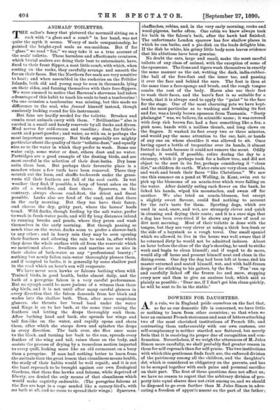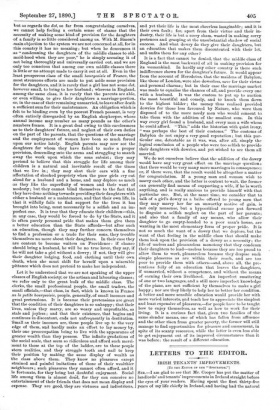DOWRIES FOR DAUGHTERS.
AS a rule, we in England pride ourselves on the fact that, so far as our domestic life is concerned, we have little or nothing to learn from other countries; so that when we hear an eminent French statesman and man of letters attacking two of the most cherished institutions of French life, and contrasting them unfavourably with our own customs, our self-complacency is neither startled nor flattered, but merely feels that it is receiving its proper due of recognition and con- firmation. Nevertheless, if we weigh the utterances of M. Jules Simon more carefully, we shall probably find greater reason in them for self-reproach than for self-praise. The two institutions with which this gentleman finds fault are, the enforced division of the patrimony among all the children, and the daughter's dot, which is considered so obligatory on the parents, and has to be scraped together with such pains and personal sacrifice on their part. The first of these questions does not affect us; we have no reason to regret that the arbitrary division of pro- perty into equal shares does not exist among us, and we should be disposed to go even further than M. Jules Simon in advo- cating a freedom of apporticnment on the part of the father; but as regards the dot, so far from congratulating ourselves, we cannot help feeling a certain sense of shame that the necessity of making some kind of provision for the daughters -of a family is so little considered among us. With M. Simon's main objection to the system we are not concerned at all, for in this country it has no meaning ; but when he denounces it as "condemning the daughters of the middle classes to old- maid-hood when they are poor," he is simply accusing it of not being thoroughly and universally carried out, and we are -only too conscious that among our own middle classes there is little or no attempt made to carry it out at all. Even in the least prosperous class of the small bourgeoisie of France, the most strenuous efforts are made to pat aside some provision for the daughters, and it is rarely that a girl has not some dot, however small, to bring to her husband; whereas in England, among the same class, it is rarely that the parents are able, or even willing, to give their daughters a marriage-portion, or, in the case of their remaining unmarried, to leave after death a sufficient sum for their maintenance. An obligation which is felt to be binding even by the poorest French peasant, is very -often entirely disregarded by an English shopkeeper, whose annual income may number as many pounds as the other's numbers francs. It is a great deal owing to this carelessness -as to their daughters' future, and neglect of their own duties on the part of the parents, that the questions of the marriage and the employment of women have been so much forced npon our notice lately. English parents may now see the daughters for whom they have failed to make a proper provision, descending into the arena and struggling to snatch away the work upon which the sons subsist; they may pretend to believe that this struggle for life among their -children is a natural and inevitable result of the times that we live in ; they may shut their ears with a fine affectation of shocked propriety when the poor girls cry out aloud for a husband and a home, and may deplore as much as they like the superfluity of women and their want of modesty ; but they cannot blind themselves to the fact that they have done nothing towards providing their daughters with either a husband or a maintenance, and that their own life, in that it wilfully fails to find support for the lives it has brought into being, must necessarily be a selfish and an im- perfect one. It is true that they educate their children—this, in any case, they would be forced to do by the State, and it ils often purely personal pride that makes them give them a better education than the State affords—but after such an education, though they may further concern themselves to find a profession or a trade for their sons, they trouble themselves no more about their daughters. In their case they are content to become waiters on Providence : if chance should bring a husband, he will be no true lover, they say, if he will not take a girl without a dowry; if not, they will give their daughter lodging, food, and clothing until their own death, when she must shift for herself upon a miserable pittance which does not pretend to make her independent.
Let it be understood that we are not speaking of the upper -classes of English society, or the artisan and labouring classes ; we refer only to the great bulk of the middle class. The ,clerks, the small professional people, the small traders, the -small officials,—that class, in fact, which is known in France as la petite bourgeoisie, people, generally, of small incomes and great pretensions. It is because their pretensions are great that the condition of their daughters is so unhappy; that their lives, unless they marry, are so weary and unprofitable, so stale and joyless ; and that their existence, that begins and continues in discontent, ends not unfrequently in destitution. Small as their incomes are, these people live up to the very edge of them, and hardly make an effort to lay money by, their one preoccupation being to live with the appearance of greater wealth than they possess. The infinite gradations of the social scale, that seem so ridiculous and afford such merri- ment to those at the top of the ladder, are to these people stern realities, and they struggle tooth and nail to keep their position by making the same display of wealth as the class above them. They know no pleasures except strained and painful imitations of those of their wealthier neighbours ; such pleasures they cannot often afford, and it is fortunate, for they bring but doubtful enjoyment. Social life among them is almost dead, for they can conceive no entertainment of their friends that does not mean display and expense. They are good, they are virtuous and industrious,
and yet their life is the most cheerless imaginable; and it is their own fault; for, apart from their virtue and their in- dustry, their life is but a sorry sham, wasted in making sorry pretences and grasping at the unsubstantial shadow of social success. And what dowry do they give their daughters, but an education that makes them discontented with their lot, and unfits them for any other?
It is a fact that cannot be denied, that the middle class of England is the most backward of all in making provision for its womankind. In hardly any other country is there such indifference shown for the daughter's future. It would appear from the account of Herodotus, that the maidens of Babylon, like those of London, were also dowerless, save for their virtue and personal charms ; but in their case the marriage market was made to equalise the chances of all, and provide every one with a husband. It was the custom to put up to auction the most beautiful and comely, and to knock them down to the highest bidder ; the money thus realised provided dowries for those less favoured by Nature, who were then disposed of to the more needy men who would consent to take them with the addition of the smallest sum. In this
way every girl found a husband, and every man a wife whom
he could afford. "This," adds the historian with quiet irony, "was perhaps the best of their customs." The customs of Babylon do not enjoy a very good reputation ; but this par- ticular one, detestable as it was, was, after all, simply the logical conclusion of a people who were too selfish to provide their daughters with dowries, and yet wished to see them all married.
We do not ourselves believe that the addition of the dowry would have any very great effect on the marriage question; that there would be very many more marriages in consequence; or, if there were, that the result would be altogether a matter for congratulation. If a young man and woman wish to
marry each other, and the latter is content to wait, the former can generally find means of supporting a wife, if he.% worth anything, and is really anxious to provide himself with that particular one. But, at the same time, we consider that to talk of a girl's dowry as a bribe offered to young men that
they may marry her for an unworthy motive of gain, is not only nonsense, but a hypocritical excuse put forward to disguise a selfish neglect on the part of her parents; and also that a family of any means, who allow their daughter to go empty-handed to a poor man's house, are wanting in the most elementary form of proper pride. It is not so much the want of a dowry that we deplore, but the want of that feeling in the middle class that should make them look upon the provision of a dowry as a necessity; the life of useless and pleasureless monotony that they condemn their daughters to lead—useless because they are too proud to allow them to work, pleasureless because they despise such simple pleasures as are within their reach, and are too poor to provide them with others—and, above all, the pre- tentious folly of an education that leaves the daughters, if unmarried, without a competence, and without the means of earning their own livelihood. An imperfect smattering of one or two languages, and a still more imperfect knowledge of the piano, are not sufficient by themselves to make a girl happy ; nor are they likely to help her to better her condition.
A better and more sensible education would provide her with more varied interests, and teach her to appreciate the simplest and least expensive of pleasures,—for people have to be taught how to enjoy themselves, as well as how to work for their living. It is a curious fact that, given two families of the same slender means, one of which has fallen from affluence and the other risen from greater poverty, the former will still manage to find opportunities for pleasure and amusement, in spite of its scanty resources, while the latter is even less able to get enjoyment out of its improved circumstances than it was before : the result of a different education.



































 Previous page
Previous page